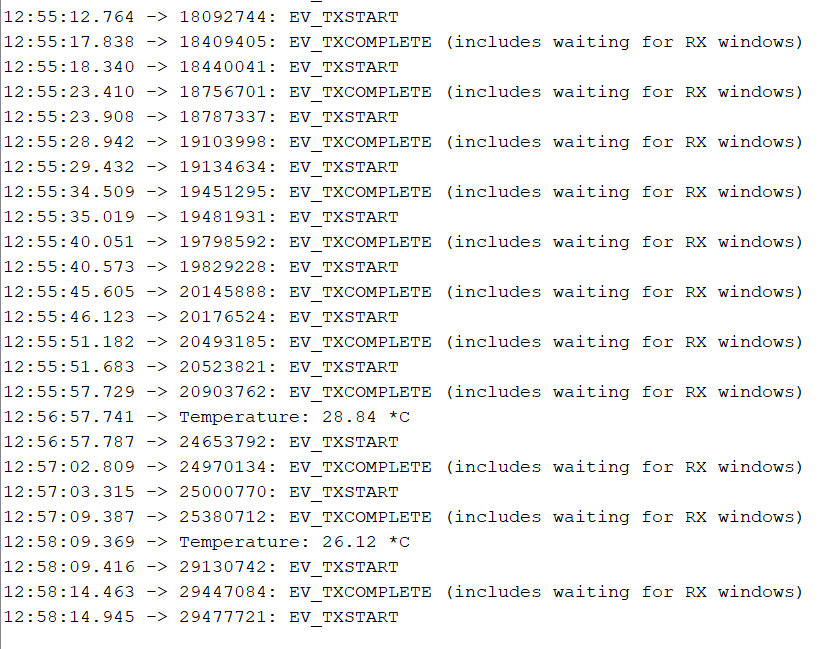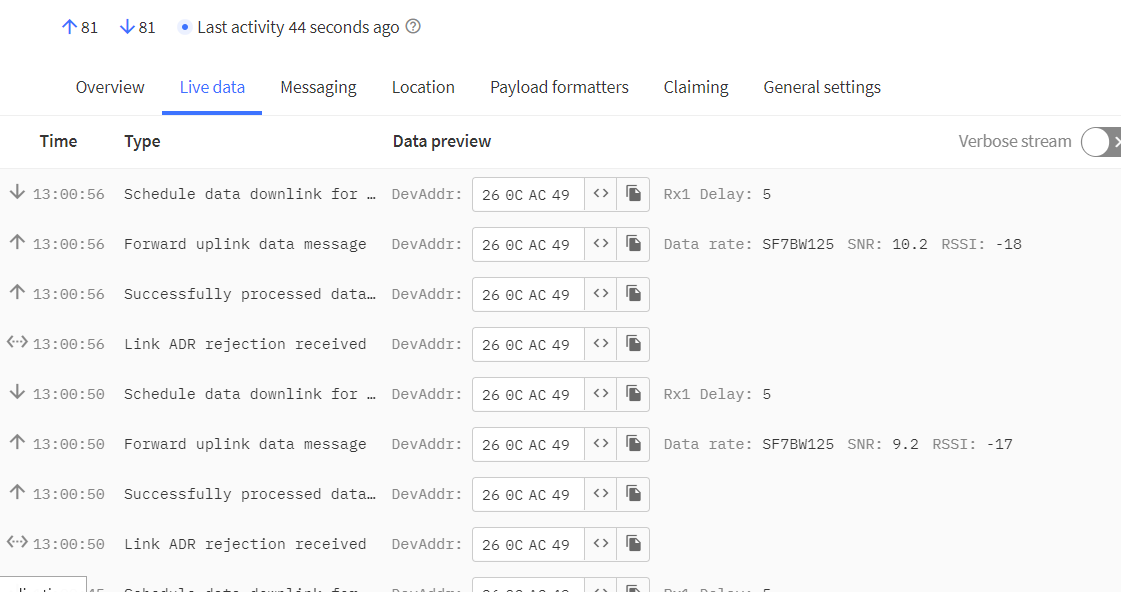Hello everyone, I am new to LoRaWAN and I am testing the Heltec Wireless Stick modules as end devices, for this I used the recommended library which was LMIC and it works correctly, but when connecting to TTN through ABP the transmissions have a kind of retransmission of events, as you can see in the image

As you can see the information is sent but the events are very annoying since they appear in TTN as packets without any information.

I have reviewed some forums and they suggest that I separate the end devices from the gateway at a certain distance and some other alternatives that do not give me a solution, I hope you can help me and thanks in advance
Here´s my code ![]()
#include <lmic.h>
#include <hal/hal.h>
#include <SPI.h>
#include <Arduino.h>
#include <math.h>
// include the DHT22 Sensor Library
#include "DHT.h"
// DHT digital pin and sensor type
#define DHTPIN 10
#define DHTTYPE DHT22
// configurar el pin utilizado para la medicion de voltaje del divisor resistivo del NTC
#define CONFIG_THERMISTOR_ADC_PIN A0
// configurar el valor de la resistencia que va en serie con el termistor NTC en ohms
#define CONFIG_THERMISTOR_RESISTOR 9550l
#ifdef COMPILE_REGRESSION_TEST
// LoRaWAN NwkSKey, network session key
static const PROGMEM u1_t NWKSKEY[16] = { 0x15, 0x32, 0xEE, 0x5E, 0x50, 0x3D, 0xD4, 0xB3, 0xC1, 0xF1, 0x74, 0x7E, 0x95, 0x6E, 0x1C, 0x93 };
// LoRaWAN AppSKey, application session key
static const u1_t PROGMEM APPSKEY[16] = { 0x9A, 0x54, 0x9D, 0x9F, 0x55, 0x54, 0xFA, 0xB4, 0x87, 0x23, 0x74, 0xA1, 0xBC, 0x88, 0xFE, 0x77 };
#ifndef COMPILE_REGRESSION_TEST
static const u4_t DEVADDR = 0x260CAC49 ;
#else
static const u4_t DEVADDR = 0;
#endif
void os_getArtEui (u1_t* buf) { }
void os_getDevEui (u1_t* buf) { }
void os_getDevKey (u1_t* buf) { }
static uint8_t payload[5];
static osjob_t sendjob;
const unsigned TX_INTERVAL = 60;
const lmic_pinmap lmic_pins = {
.nss = 18,
.rxtx = LMIC_UNUSED_PIN,
.rst = 14,
.dio = {26, 35, 34},
.rxtx_rx_active = 0,
.rssi_cal = 8, // LBT cal for the Adafruit Feather M0 LoRa, in dB
.spi_freq = 8000000,
};
// init. DHT
DHT dht(DHTPIN, DHTTYPE);
void onEvent (ev_t ev) {
Serial.print(os_getTime());
Serial.print(": ");
switch(ev) {
case EV_SCAN_TIMEOUT:
Serial.println(F("EV_SCAN_TIMEOUT"));
break;
case EV_BEACON_FOUND:
Serial.println(F("EV_BEACON_FOUND"));
break;
case EV_BEACON_MISSED:
Serial.println(F("EV_BEACON_MISSED"));
break;
case EV_BEACON_TRACKED:
Serial.println(F("EV_BEACON_TRACKED"));
break;
case EV_JOINING:
Serial.println(F("EV_JOINING"));
break;
case EV_JOINED:
Serial.println(F("EV_JOINED"));
break;
case EV_JOIN_FAILED:
Serial.println(F("EV_JOIN_FAILED"));
break;
case EV_REJOIN_FAILED:
Serial.println(F("EV_REJOIN_FAILED"));
break;
case EV_TXCOMPLETE:
Serial.println(F("EV_TXCOMPLETE (includes waiting for RX windows)"));
if (LMIC.txrxFlags & TXRX_ACK)
Serial.println(F("Received ack"));
if (LMIC.dataLen) {
Serial.println(F("Received "));
Serial.println(LMIC.dataLen);
Serial.println(F(" bytes of payload"));
}
// Schedule next transmission
os_setTimedCallback(&sendjob, os_getTime()+sec2osticks(TX_INTERVAL), do_send);
break;
case EV_LOST_TSYNC:
Serial.println(F("EV_LOST_TSYNC"));
break;
case EV_RESET:
Serial.println(F("EV_RESET"));
break;
case EV_RXCOMPLETE:
// data received in ping slot
Serial.println(F("EV_RXCOMPLETE"));
break;
case EV_LINK_DEAD:
Serial.println(F("EV_LINK_DEAD"));
break;
case EV_LINK_ALIVE:
Serial.println(F("EV_LINK_ALIVE"));
break;
case EV_TXSTART:
Serial.println(F("EV_TXSTART"));
break;
case EV_TXCANCELED:
Serial.println(F("EV_TXCANCELED"));
break;
case EV_RXSTART:
/* do not print anything -- it wrecks timing */
break;
case EV_JOIN_TXCOMPLETE:
Serial.println(F("EV_JOIN_TXCOMPLETE: no JoinAccept"));
break;
default:
Serial.print(F("Unknown event: "));
Serial.println((unsigned) ev);
break;
}
}
//-------------------------------------------------------------------------------------------
int32_t thermistor_get_resistance(uint16_t adcval)
{
// calculamos la resistencia del NTC a partir del valor del ADC
return (CONFIG_THERMISTOR_RESISTOR * ((4095.0 / adcval) - 1));
}
//-------------------------------------------------------------------------------------------
float thermistor_get_temperature(int32_t resistance)
{
float temp;
temp = log(resistance);
temp = 1 / (-0.00852320883160124 + (0.00145388599096923 * temp) + (-0.0000030650257379238766 * temp * temp * temp));
return temp - 273.15;
}
//-------------------------------------------------------------------------------------------
void do_send(osjob_t* j){
// Check if there is not a current TX/RX job running
if (LMIC.opmode & OP_TXRXPEND) {
Serial.println(F("OP_TXRXPEND, not sending"));
} else {
float temperatura;
uint32_t resistencia;
resistencia = thermistor_get_resistance(analogRead(CONFIG_THERMISTOR_ADC_PIN));
temperatura = thermistor_get_temperature(resistencia);
Serial.print("Temperature: "); Serial.print(temperatura);
Serial.println(" *C");
int16_t celciusInt = temperatura * 100; // convert to signed 16 bits integer: 0x0929
uint8_t buffer[2]; // reserve 2 bytes in memory
buffer[0] = celciusInt >> 8;
buffer[1] = celciusInt;
// Send on port 1, without asking for confirmation:
LMIC_setTxData2(1, buffer, sizeof(buffer), 0); // 0x0929 for 23.45
}
// Next TX is scheduled after TX_COMPLETE event.
}
void setup() {
delay(5000);
while (!Serial);
Serial.begin(9600);
delay(100);
Serial.println(F("Starting"));
// LMIC init
os_init();
// Reset the MAC state. Session and pending data transfers will be discarded.
LMIC_reset();
uint8_t appskey[sizeof(APPSKEY)];
uint8_t nwkskey[sizeof(NWKSKEY)];
memcpy_P(appskey, APPSKEY, sizeof(APPSKEY));
memcpy_P(nwkskey, NWKSKEY, sizeof(NWKSKEY));
LMIC_setSession (0x13, DEVADDR, nwkskey, appskey);
// We'll disable all 72 channels used by TTN
// LMIC_selectSubBand(2);
for (int c = 0; c < 72; c++){
LMIC_disableChannel(c);
}
// We'll only enable Channel 16 (905.5Mhz) since we're transmitting on a single-channel
LMIC_enableChannel(12);
// Disable link check validation
LMIC_setLinkCheckMode(0);
// TTN uses SF9 for its RX2 window.
LMIC.dn2Dr = DR_SF9;
// Set data rate and transmit power for uplink
LMIC_setDrTxpow(DR_SF7,14);
// Start job
do_send(&sendjob);
}
void loop() {
os_runloop_once();
}EDIT:
To clarify something, I have modified ABP by OTAA with the same problem, I thought I could just get around the problem but the uplinks persist.
16:05:34.320 -> Packet queued
16:05:39.540 -> 4740306: EV_TXCOMPLETE (includes waiting for RX windows)
16:05:40.008 -> 4770942: EV_TXSTART
16:05:45.242 -> 5098017: EV_TXCOMPLETE (includes waiting for RX windows)
16:05:45.756 -> 5128654: EV_TXSTART
16:05:50.939 -> 5454447: EV_TXCOMPLETE (includes waiting for RX windows)
16:05:51.456 -> 5485083: EV_TXSTART
16:05:56.678 -> 5810878: EV_TXCOMPLETE (includes waiting for RX windows)
16:05:57.148 -> 5841514: EV_TXSTART
16:06:03.374 -> 6230326: EV_TXCOMPLETE (includes waiting for RX windows)
16:07:03.378 -> 9980347: EV_TXSTART
16:07:03.378 -> Packet queued
16:07:08.641 -> 10308703: EV_TXCOMPLETE (includes waiting for RX windows)
16:07:09.096 -> 10339340: EV_TXSTART
16:07:14.350 -> 10665134: EV_TXCOMPLETE (includes waiting for RX windows)
16:07:14.813 -> 10695770: EV_TXSTART
16:07:20.032 -> 11021565: EV_TXCOMPLETE (includes waiting for RX windows)
16:07:20.500 -> 11052201: EV_TXSTART
16:07:25.710 -> 11377995: EV_TXCOMPLETE (includes waiting for RX windows)
16:07:26.222 -> 11408631: EV_TXSTART
16:07:31.459 -> 11734426: EV_TXCOMPLETE (includes waiting for RX windows)
16:07:31.919 -> 11765062: EV_TXSTART
16:07:37.118 -> 12090857: EV_TXCOMPLETE (includes waiting for RX windows)
16:07:37.622 -> 12121493: EV_TXSTART
16:07:42.828 -> 12447288: EV_TXCOMPLETE (includes waiting for RX windows)
16:07:43.343 -> 12477924: EV_TXSTART
16:07:48.545 -> 12803719: EV_TXCOMPLETE (includes waiting for RX windows)
16:07:49.045 -> 12834355: EV_TXSTART
16:07:55.261 -> 13223164: EV_TXCOMPLETE (includes waiting for RX windows)
16:08:55.246 -> 16973184: EV_TXSTART
16:08:55.294 -> Packet queued